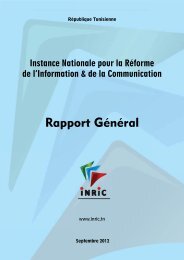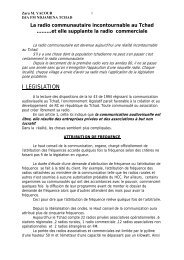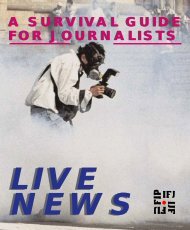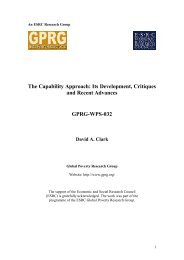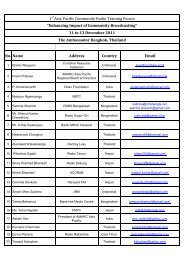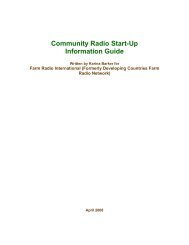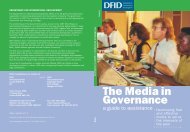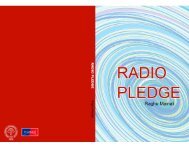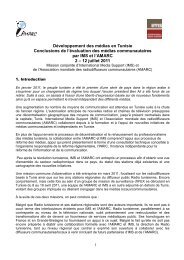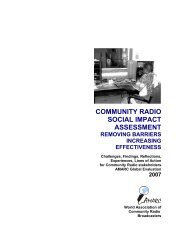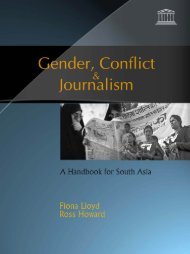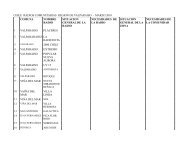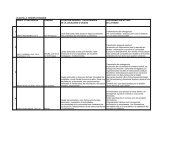WHAT IS COMMUNITY RADIO - amarc
WHAT IS COMMUNITY RADIO - amarc
WHAT IS COMMUNITY RADIO - amarc
Create successful ePaper yourself
Turn your PDF publications into a flip-book with our unique Google optimized e-Paper software.
Article 13. Privacy<br />
All people have the right to be protected from the publication of allegations irrelevant to the<br />
public interest, or of private photographs or other private communication without authorisation,<br />
or of personal information given or received in confidence. Databases derived from personal or<br />
workplace communications and transactions should not be used for unauthorised commercial or<br />
general surveillance purposes. However, nations should take care that the protection of privacy<br />
does not unduly interfere with the freedom of expression or the administration of justice.<br />
Article 14. Harm<br />
People have the right to demand that media actively counter incitement to hate, prejudice,<br />
violence, and war. Violence should not be presented as normal, “manly”, or entertaining, and<br />
true consequences of and alternatives to violence should be shown. Other violations of human<br />
dignity and integrity to be avoided include stereotypic images that distort the realities and<br />
complexities of people’s lives. Media should not ridicule, stigmatise, or demonise people on the<br />
basis of gender, race, class, ethnicity, language, sexual orientation, and physical or mental<br />
condition.<br />
Article 15. Justice<br />
People have the right to demand that media respects standards of due process in the coverage of<br />
trials. This implies that media should not presume guilt before a verdict of guilt, invade the<br />
privacy of defendants or others, and should not televise criminal trials in real time while the trial<br />
is in progress.<br />
Article 16. Consumption<br />
People have the right to useful and factual consumer information, and to be protected from<br />
misleading and distorted advertising. Media should avoid and, if necessary, expose, promotion<br />
disguised as news and entertainment (infomercials, product placement, children’s programmes<br />
that use franchised characters and toys, etc), and the creation of wasteful, unnecessary, harmful<br />
or ecologically damaging needs, wants, products and activities. Advertising directed at children<br />
should receive special scrutiny.<br />
Article 17. Accountability<br />
People have the right to hold media accountable to the general public for their adherence to the<br />
standards established in this Charter. For that purpose, media should establish mechanisms,<br />
including self-regulatory bodies, that monitor and account for measures taken to achieve<br />
compliance.<br />
Article 18. Implementation<br />
In consultation with Signatories, national and international mechanisms will be organised to<br />
publicise this Charter; implement it in as many countries as possible and in the international law;<br />
monitor and assess the performance of countries and media in the light of these standards;<br />
receive complaints about violations; advise on adequate remedial measures; and to establish<br />
procedures for the periodic review, development and modification of this Charter.<br />
46<br />
What is Community Radio? A Resource Guide<br />
Published by AMARC Africa and Panos Southern Africa in collaboration with IB<strong>IS</strong>/Interfund and WACC



